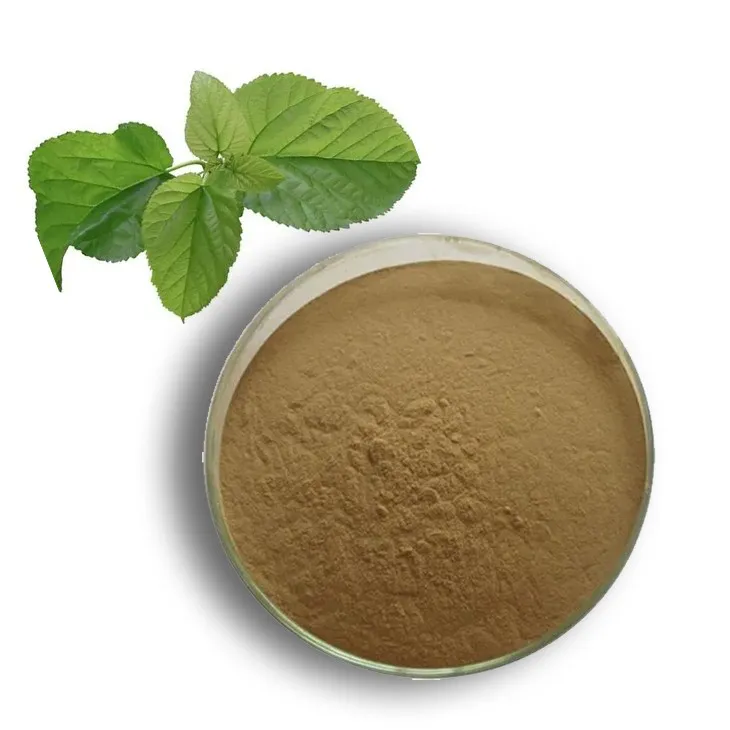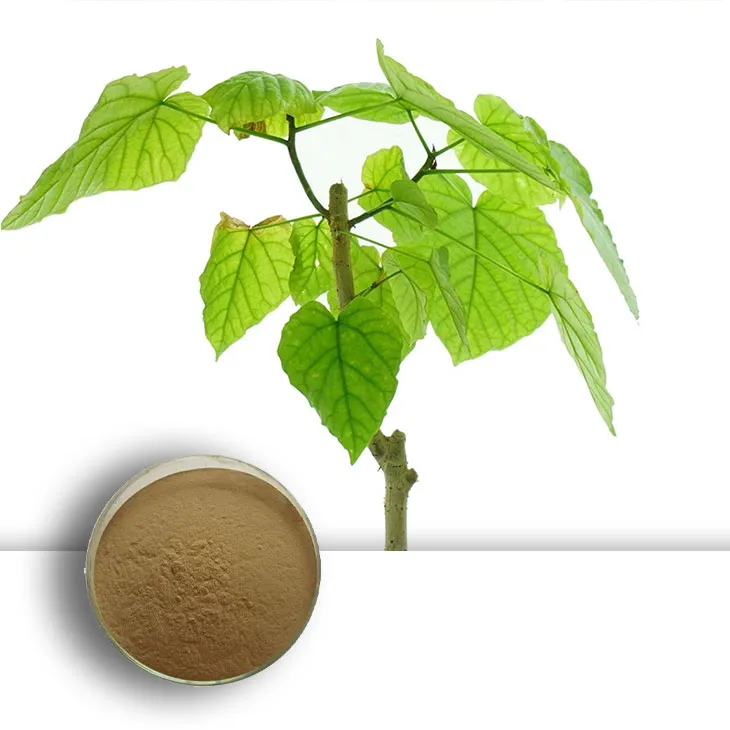- 0086-571-85302990
- sales@greenskybio.com
Can mulberry leaf extract reduce cholesterol?
2024-11-14

Introduction
Cholesterol management is a crucial aspect of maintaining good health. High levels of cholesterol, particularly low - density lipoprotein (LDL) cholesterol, are associated with an increased risk of heart disease and other cardiovascular problems. In recent years, there has been growing interest in natural products that may help in reducing cholesterol levels. Mulberry leaf Extract is one such natural product that has been the subject of research in this regard.

Bioactive Compounds in Mulberry leaf Extract
1. Flavonoids
Mulberry leaves are rich in flavonoids, which are a class of plant - based compounds known for their antioxidant properties. Flavonoids such as rutin and Quercetin have been found in Mulberry leaf Extract. These flavonoids may play a role in cholesterol reduction. Antioxidants are important as they can help prevent oxidative stress in the body. Oxidative stress can damage cells and contribute to the development of various diseases, including those related to high cholesterol. For example, rutin has been shown in some studies to have anti - inflammatory effects and may also influence lipid metabolism, which could potentially lead to a reduction in cholesterol levels.
2. Alkaloids
Another group of bioactive compounds in mulberry leaf extract are alkaloids. 1 - Deoxynojirimycin (DNJ) is an alkaloid found in mulberry leaves. DNJ has been studied for its potential effects on blood sugar regulation, but it may also have implications for cholesterol management. It is thought that DNJ may interfere with the absorption of carbohydrates in the intestine. This interference could potentially have an indirect effect on cholesterol levels. Since abnormal carbohydrate metabolism can be associated with dyslipidemia (abnormal lipid levels in the blood), any compound that can regulate carbohydrate absorption might also have an impact on cholesterol.
Mechanisms of Action on Cholesterol
1. Inhibition of Cholesterol Absorption
One possible mechanism by which mulberry leaf extract could lower cholesterol is by inhibiting its absorption in the intestine. The bioactive compounds in the extract may interact with the transporters or enzymes involved in cholesterol uptake. For example, flavonoids may bind to cholesterol molecules, preventing them from being absorbed into the bloodstream. This would lead to less cholesterol entering the body and could result in a decrease in overall cholesterol levels.
2. Modulation of Lipid Metabolism
Mulberry leaf extract may also modulate lipid metabolism. It could affect the enzymes involved in the synthesis and breakdown of lipids. For instance, it might enhance the activity of enzymes that break down cholesterol, such as lipoprotein lipase. Lipoprotein lipase is responsible for hydrolyzing triglycerides in lipoproteins, which is an important step in lipid metabolism. By increasing the activity of this enzyme, the extract could help in reducing the levels of triglycerides and cholesterol in the blood.
Pre - clinical Studies
1. Animal Studies
Several animal studies have been conducted to investigate the effects of mulberry leaf extract on cholesterol. In rodent models, for example, animals fed with a diet supplemented with mulberry leaf extract showed significant reductions in total cholesterol, LDL - cholesterol, and triglyceride levels. These studies suggest that the extract has the potential to improve lipid profiles in animals. However, it is important to note that the results obtained from animal studies may not always directly translate to humans. Different species may have different physiological responses to the extract.
2. In - vitro Studies
In - vitro studies using cell cultures have also provided some insights. Researchers have studied the effects of mulberry leaf extract on liver cells and intestinal cells, which are important in lipid metabolism. In these studies, the extract has been shown to affect the expression of genes related to cholesterol synthesis and transport. For example, it may down - regulate the genes responsible for cholesterol production, leading to a decrease in cholesterol synthesis. These in - vitro results further support the hypothesis that mulberry leaf extract could have an impact on cholesterol levels.Clinical Studies
1. Small - scale Human Trials
Some small - scale human trials have been carried out to evaluate the effects of mulberry leaf extract on cholesterol in humans. In these trials, participants were given mulberry leaf extract supplements for a certain period. The results have been somewhat mixed. While some trials reported a modest reduction in cholesterol levels, others did not show significant differences. One possible reason for the inconsistent results could be the differences in the study designs, such as the dosage of the extract used, the duration of the trial, and the characteristics of the participants (e.g., age, gender, baseline cholesterol levels).
2. Larger - scale Clinical Trials Needed
To draw more conclusive evidence regarding the cholesterol - lowering effects of mulberry leaf extract, larger - scale clinical trials are needed. These trials should be well - designed, with proper control groups, standardized dosages of the extract, and long - enough study durations. They should also take into account various factors that could influence the results, such as diet and lifestyle of the participants. Only through such comprehensive large - scale trials can we determine whether mulberry leaf extract can truly be an effective option for cholesterol management in humans.Considerations for Use
1. Dosage
If considering using mulberry leaf extract for cholesterol management, the appropriate dosage is an important factor. Currently, there is no well - established standard dosage. Different studies have used different dosages, ranging from a few hundred milligrams to several grams per day. Determining the optimal dosage requires more research. Taking too little may not produce the desired effect, while taking too much could potentially lead to adverse effects.
2. Safety
Generally, mulberry leaf extract is considered safe for most people when consumed in moderation. However, some individuals may experience side effects such as gastrointestinal discomfort. Pregnant and breastfeeding women should be especially cautious when considering using any supplements, including mulberry leaf extract, as there is limited information on its safety in these populations. Additionally, people with pre - existing medical conditions, such as liver or kidney diseases, should consult their healthcare providers before using the extract.Conclusion
Mulberry leaf extract contains bioactive compounds that have the potential to lower cholesterol through various mechanisms. Pre - clinical studies in animals and in - vitro have shown promising results. However, the evidence from human clinical trials so far is inconclusive. While some small - scale trials suggest a possible cholesterol - lowering effect, larger - scale, well - designed clinical trials are needed to confirm this. When considering using mulberry leaf extract for cholesterol management, factors such as dosage and safety should also be taken into account. Overall, while mulberry leaf extract holds some promise in cholesterol management, more research is required to fully understand its potential benefits and limitations.
FAQ:
1. What are the main bioactive compounds in mulberry leaf extract that might affect cholesterol?
Mulberry leaf extract contains various bioactive compounds such as flavonoids, alkaloids, and polysaccharides. Flavonoids, for example, have antioxidant properties and may help in reducing oxidative stress which is related to cholesterol metabolism. Alkaloids may also play a role in modulating certain enzymes involved in cholesterol synthesis or clearance in the body.
2. How does mulberry leaf extract potentially lower cholesterol?
It may work through multiple mechanisms. One way is by inhibiting the absorption of dietary cholesterol in the intestines. Another possibility is that it can stimulate the liver to increase the production of bile acids, which are made from cholesterol. As the liver uses cholesterol to make bile acids, this can lead to a reduction in the overall cholesterol levels in the body. Additionally, it might affect lipid - metabolizing enzymes and receptors in a way that promotes lower cholesterol levels.
3. Are there any clinical trials on the effect of mulberry leaf extract on cholesterol?
Yes, there are some clinical trials. However, the results are not entirely conclusive. Some trials have shown a modest reduction in cholesterol levels with the use of mulberry leaf extract. But more research is needed to establish its efficacy, optimal dosage, and long - term safety for cholesterol management.
4. Can mulberry leaf extract be used as a sole treatment for high cholesterol?
At present, it is not recommended to use mulberry leaf extract as the sole treatment for high cholesterol. High cholesterol is a complex condition, and lifestyle changes such as a healthy diet, regular exercise, and sometimes medication are the mainstays of treatment. While mulberry leaf extract may have some potential benefits, it should be considered as a complementary approach rather than a replacement for established medical treatments.
5. What are the possible side effects of using mulberry leaf extract for cholesterol management?
Some possible side effects may include gastrointestinal discomfort such as nausea, vomiting, or diarrhea, although these are not very common. In addition, there may be potential interactions with other medications, especially those used for cholesterol management or blood - thinning medications. Therefore, it is important to consult a healthcare provider before starting to use mulberry leaf extract for cholesterol - related purposes.
Related literature
- The Effect of Mulberry Leaf Extract on Cholesterol Metabolism: A Review"
- "Clinical Trials Assessing Mulberry Leaf Extract for Cholesterol Reduction"
- "Bioactive Compounds in Mulberry Leaf Extract and Their Impact on Lipid Profiles"
- ▶ Hesperidin
- ▶ citrus bioflavonoids
- ▶ plant extract
- ▶ lycopene
- ▶ Diosmin
- ▶ Grape seed extract
- ▶ Sea buckthorn Juice Powder
- ▶ Beetroot powder
- ▶ Hops Extract
- ▶ Artichoke Extract
- ▶ Reishi mushroom extract
- ▶ Astaxanthin
- ▶ Green Tea Extract
- ▶ Curcumin Extract
- ▶ Horse Chestnut Extract
- ▶ Other Problems
- ▶ Boswellia Serrata Extract
- ▶ Resveratrol Extract
- ▶ Marigold Extract
- ▶ Grape Leaf Extract
- ▶ blog3
-
Cranberry Plants and Skin - care Products.
2024-11-14
-
Saponin Extract
2024-11-14
-
Phellodendron Extract
2024-11-14
-
Shikonin
2024-11-14
-
Lemon Balm Extract
2024-11-14
-
Soy Extract
2024-11-14
-
White mustard seed extract
2024-11-14
-
Berberis aristata Extract
2024-11-14
-
Ginseng Root Extract
2024-11-14
-
Stevia Extract
2024-11-14
-
Marigold Extract
2024-11-14





















